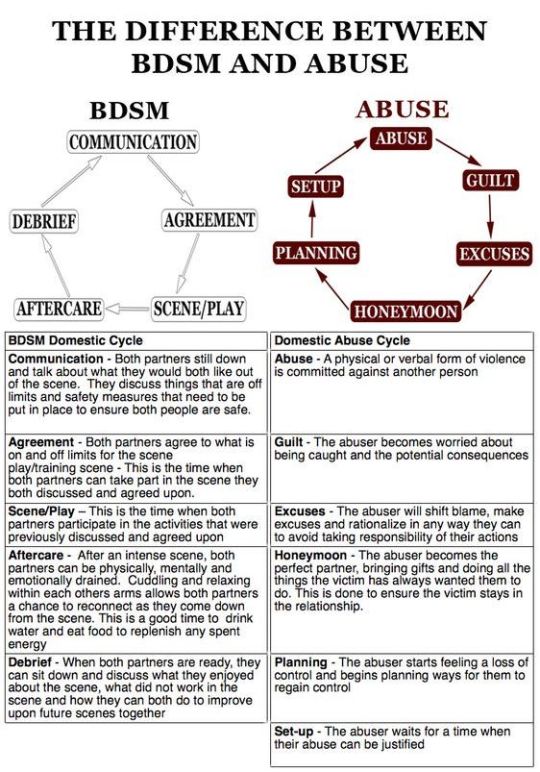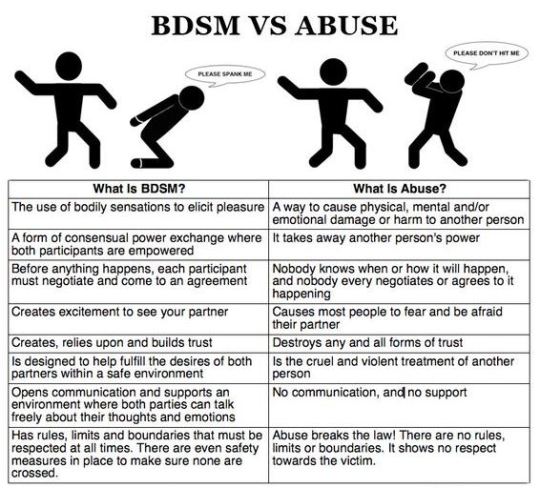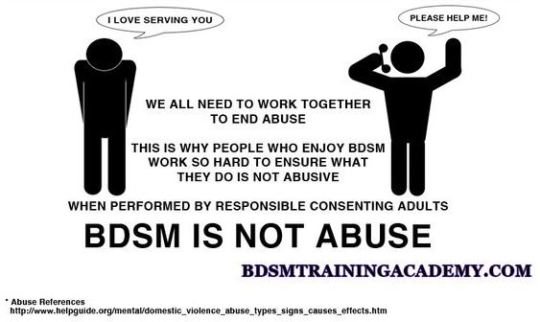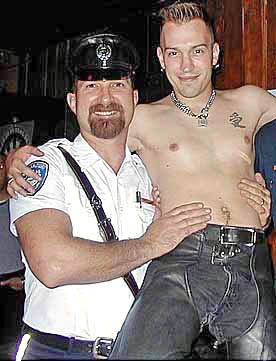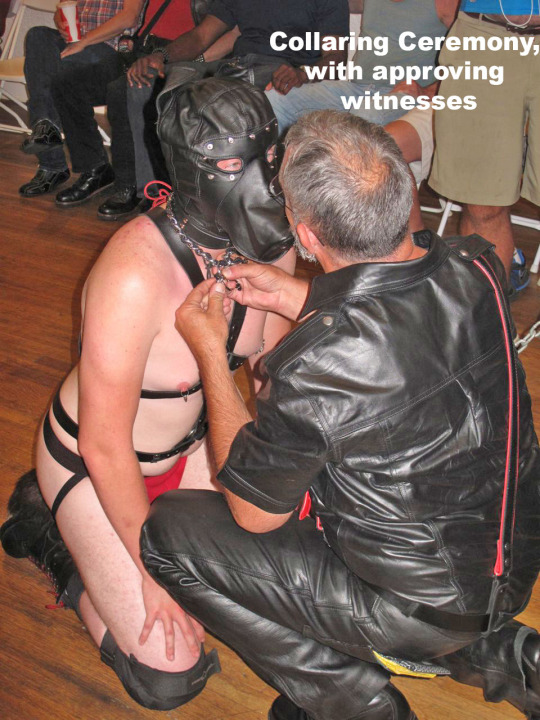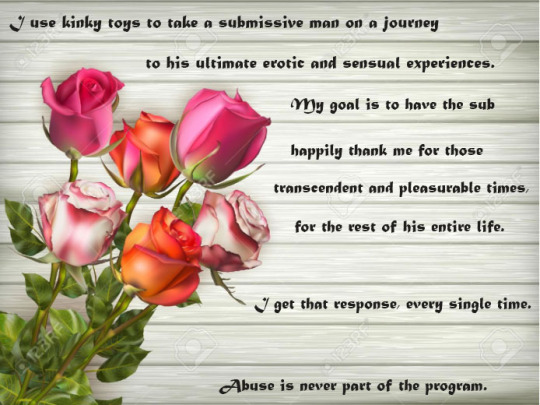Hundreds more articles like this can be found
dominantlife:
BDSM activity, even where clearly consensual, can be and frequently is prosecuted under state criminal laws dealing with assault, aggravated assault, sexual assault or sexual abuse. Such criminal prosecution can arise in various circumstances, including:
- The BDSM “scene” turns out to be more intense or painful or harmful than the submissive participant anticipated, and she or he goes to the police.
- Injury is caused that is sufficiently serious or sufficiently visible that it is brought to the attention of the police by an observer, by hospital personnel or by a friend or relative of the submissive participant.
- The police raid a BDSM event and observe conduct that they interpret as unlawful.
- A BDSM relationship ends, leaving the submissive partner with bad feelings, and he or she complains to the police about assault or abuse.
- Someone with a grudge against a participant in the BDSM scene or relationship makes a complaint to the police.
- Or pictures, videos, emails, film or sound recordings of BDSM conduct somehow come into the hands of the police.
The Critical Issue: Consent
The nature of the criminal offense here is that one person causes physical harm—injury and/or intense pain—to another person. It is important to understand that the law sees this as causing harm, not engaging in mutually beneficial conduct. This means that the law treats BDSM as violence, not as sex. That explains why the issue of consent is different in BDSM cases than in rape cases. In a rape case, the sex act is not viewed as criminal unless it can be shown that one party did not consent. In a BDSM case, however, the causing of physical harm is, in and of itself, criminal. The question is whether and to what extent the law will allow such criminal conduct to be excused by the fact that the injured participant consented to have harm done to her or him.
As long as courts and lawmakers put BDSM practice in the same category as criminal assault—which is a view that the “Consent Counts” campaign will try to change—it is not surprising that they will be reluctant to allow consent as a defense to anything more than minor harm or injury. And sure enough, that is the pattern shown by the court cases, even where a court is interpreting a statute that seems on its face to allow consent to be a defense in any case where there is “serious” injury. Moreover, the courts’ reluctance to allow consent as a defense is undoubtedly influenced by the general public’s misunderstanding of and adverse reaction to BDSM as a “perverse” or even “immoral” practice.
The State Statutes—Consent as a Defense
The definitions of assault, abuse and other such crimes involving infliction of physical harm, as well as the provisions (if any) dealing with consent as a defense to such criminal charges, are matters of individual states’ laws. There is no federal law in this area. The laws vary from state to state, and many state laws on assault do not mention consent as a defense.
There are, however, a number of state assault statutes that do provide for consent as a defense. Such statutes invariably place limits on the consent defense, both in terms of the degree of harm and in terms of the way in which consent is given and the types of people who cannot legally give their consent. Many such laws closely follow the language of the Model Penal Code’s (MPC) section on consent:
§ 2.11. Consent.
(1) In General. The consent of the victim to conduct charged to constitute an offense or to the result thereof is a defense if such consent negatives an element of the offense or precludes the infliction of the harm or evil sought to be prevented by the law defining the offense.
(2) Consent to Bodily Injury. When conduct is charged to constitute an offense because it causes or threatens bodily injury, consent to such conduct or to the infliction of such injury is a defense if:
(a) the bodily injury consented to or threatened by the conduct consented to is not serious; or
(b) the conduct and the injury are reasonably foreseeable hazards of joint participation in a lawful athletic contest or competitive sport or other concerted activity not forbidden by law; or
© the consent establishes a justification for the conduct under Article 3 of the Code.
(3) Ineffective Consent. Unless otherwise provided by the Code or by the law defining the offense, assent does not constitute consent if:
(a) it is given by a person who is legally incompetent to authorize the conduct charged to constitute the offense; or
(b) it is given by a person who by reason of youth, mental disease or defect or intoxication is manifestly unable or known by the actor to be unable to make a reasonable judgment as to the nature or harmfulness of the conduct charged to constitute the offense; or
© it is given by a person whose improvident consent is sought to be prevented by the law defining the offense; or
(d) it is induced by force, duress or deception of a kind sought to be prevented by the law defining the offense.
Model Penal Code § 2.11
For our purposes the key provision in section 2.11(2)(a), which allows consent as a defense to the infliction of bodily injury where the “injury…consented to is not serious”. Thus the question that courts must decide in any given case is what is meant by “serious” injury. And on this point, the MPC offers in Section 210.0 (3) a definition that, if courts would only apply it literally, is quite helpful in the BDSM context:
Section 210.0 Definitions…
3) ”serious bodily injury” means bodily injury which creates a substantial risk of death or which causes serous, permanent disfigurement, or protracted loss or impairment of the function of any bodily member or organ.
Read literally, this would allow consent as a defense to most forms of BDSM practices. Breath control and certain other play might be seen by a court as creating “a substantial risk of death”. And scarification and some other forms of “extreme” or “heavy” scenes might be found to cause “serious, permanent disfigurement, or protracted loss or impairment of the function of {a} bodily member or organ.” But a literal application of the MPC standard would permit consent as a defense in most assault or abuse prosecutions based on BDSM practices.
The problem is that the courts—not just some courts; all courts—consistently classify as “serious” almost any injury, no matter how slight, and even in some cases interpret the causing of significant pain, even with no physical injury, as “serious injury” to which consent cannot be given.
The Cases—Courts Refuse To Accept Consent as a Defense
To date, there is not a single appellate court decision anywhere in this country that has accepted consent as a defense in an assault or abuse prosecution arising from BDSM conduct. The following overview, from Consent to Harm by Vera Bergelson, 28 PaceLaw Review 683, at p.691, is a good summary of the case law:
Since any harmful act that does not fit into the “athletic” or “medical” exception is, by definition, criminal, unless the inflicted injury is not serious, assessment of the seriousness of the victim’s injury determines the outcome of many cases involving consensual harm. A typical penal statute classifies bodily injury as serious if it “creates a substantial risk of death or causes serious, permanent disfigurement, or protracted loss or impairment of the function of any bodily member or organ.” Pursuant to this definition, any short-term, non-life-threatening injury should not be deemed “serious.” Yet, as the MPC acknowledges, the assessment of the seriousness of harm is often affected by judges’ “moral judgments about the iniquity of the conduct.” Courts tend to inflate the risk and harmfulness of an activity they want to denounce. For example, any injury caused during a sadomasochistic encounter has been consistently classified as serious.
28 Pace Law Review 683, 691
An early, and typically bad, example of a pure “consent is no defense” ruling is People v Samuels, a 1967 California decision. In that case, Martin Samuels was convicted of assault based on his conduct in a film of an apparently consensual BDSM scene. The court not only rejected the consent defense, but also appeared to hold the view that any such consent would be “some form of mental aberration”:
Even if it be assumed that the victim in the ‘vertical’ film did in fact suffer from some form of mental aberration which compelled him to submit to a beating which was so severe as to constitute an aggravated assault, defendant’s conduct in inflicting that beating was no less violative of a penal statute obviously designed to prohibit one human being from severely or mortally injuring another.
People v. Samuels 250 Cal.App.2d 501, 514, 58 Cal.Rptr. 439, 447 (Cal.App. 1967)
The Samuels decision was cited as recently as 2006, in People v Febrissy. In that case, the defendant’s lawyer sought to invoke the doctrine enunciated by the Supreme Court in Lawrence v. Texas, which held (in a sodomy prosecution) that, absent a compelling societal interest (and moral disapproval is not such an interest), the government cannot make private consensual sexual activity a crime. That argument was rejected.
An argument based on Lawrence v. Texas was also rejected in the Nebraska case of State v. Van, 268 Neb.814 (2004). Van was convicted of first-degree assault on the basis of an extended imprisonment and extremely intense BDSM/torture of a gay male submissive. The submissive initially consented to practices that were quite intense, but the evidence was in conflict as to whether he later withdrew that consent. On appeal, defendant Van argued that this was a case of “two adults who, with complete and mutual consent, engaged in sexual practices common to their homosexual, BDSM lifestyle” and as such was protected under Lawrence v. Texas.
Rejecting that argument, the court made three points. First, it noted that the Lawrence opinion contained a phrase that its doctrine only applies “absent injury to a person”. Second, the court emphasized that the evidence on the issue of consent was not clear-cut. Finally, and most fundamentally, the court held—citing the other decisions discussed in this paper—that consent is not a defense to a charge of assault:
Our statutes defining first and second degree assault include no reference to consent…This court has held that “all attempts to do physical violence which amount to a statutory assault are unlawful and a breach of the peace, and a person cannot consent to an unlawful assault”.
In most BDSM assault cases, the testimony of a complaining witness (the injured person) is central to the case, and often there is conflict on the issue of consent between the defendant and the complaining witness. However, even where both participants agree that the acts in question were consensual, the courts have held that consent cannot be a defense. Thus, in Commonwealth v. Appleby, a 1980 Massachusetts case, the court said:
“Grimm’s consent to assault and battery upon him by Appleby by means of a dangerous weapon cannot absolve Appleby of the crime…”Commonwealth v. Appleby, 380 Mass.296, 311, 402N.E.2d 1051,1061 (Mass. 1980).
In Iowa v. Collier, there were wildly differing accounts given of a BDSM incident, but the judge refused to let the jury consider the question of consent. The Appellate Court upheld the conviction and ruled that consent was not a defense. Significantly, the Iowa law on assault was in most ways similar to the Model Penal Code.
Provided, that where the person doing any of the above enumerated acts, and such other person, are voluntary participants in a sport, social or other activity, not in itself criminal, and such act is a reasonably foreseeable incident of such sport or activity, and does not create an unreasonable risk of serious injury or breach of the peace, the act shall not be an assault.
I.C.A. § 708.1
The court’s moralistic tone in rejecting the consent defense is a good illustration of the type of thinking that seems to underly most judges’ handling of BDSM assault cases:
The foregoing discussion compels us to conclude that, in the present case, the legislature did not intend sadomasochistic activity to be a “sport, social or other activity” under section 708.1. We are hesitant to give a precise definition of this term and believe it is more appropriate that its meaning be interpreted on a case by case basis. However, it is obvious to this court that the legislature did not intend the term to include an activity which has been repeatedly disapproved by other jurisdictions and considered to be in conflict with the general moral principles of our society. In fact, the statutory provision in question specifically excludes activities which would “create an unreasonable risk of serious injury.” There can be little doubt that the sadomasochistic activities involved in this case expose persons to the very type of injury deemed unacceptable by the legislature. Were we to follow defendant’s broad interpretation of “social activity,” street fighting, barroom brawls and child molestation could be deemed acceptable social behavior, since such conduct is considered acceptable by some segment of society.
State v. Collier 372 N.W.2d 303, 307 (Iowa App.,1985)
People v. Jovanovic was a New York case involving an intense scene between a man and a woman who had previously engaged in extensive Internet discussion of their BDSM interests. The scene apparently went bad, and the woman went to the police. Mr. Jovanovic was tried and convicted of assault, sexual assault and kidnapping. The Court of Appeals, although it reversed the convictions on evidentiary grounds, very explicitly stated in a footnote that consent, while available as a defense to the charges of kidnapping and sexual assault, was irrelevant to the assault charge:
There is no available defense of consent on a charge of assault under Penal Law §§ 120.00[1] and 120.05[2] (contrast, Penal Law § 120.05[5] [where lack of consent is an element]). Indeed, while a meaningful distinction can be made between an ordinary violent beating and violence in which both parties voluntarily participate for their own sexual gratification, nevertheless, just as a person cannot consent to his or her own murder (see, People v. Duffy, 79 N.Y.2d 611, 584 N.Y.S.2d 739, 595 N.E.2d 814), as a matter of public policy, a person cannot avoid criminal responsibility for an assault that causes injury or carries a risk of serious harm, even if the victim asked for or consented to the act (see, e.g., State v. Brown, 154 N.J.Super. 511, 512, 381 A.2d 1231, 1232; People v. Samuels, 250 Cal.App.2d 501, 513-514, 58 Cal.Rptr. 439, 447, cert. denied, 390 U.S. 1024, 88 S.Ct. 1404, 20 L.Ed.2d 281; Commonwealth v. Appleby, 380 Mass. 296, 402 N.E.2d 1051;Iowa v. Collier, 372 N.W.2d 303).
People v. Jovanovic 263 A.D.2d 182, 198, 700 N.Y.S.2d 156, 169 (N.Y.A.D. 1 Dept.,1999)
It is important to note that the Jovanovic court cited the Samuels, Appleby and Collier decisions, confirming that the prevailing view is that there is a settled precedent, established by a series of decisions in state courts across the country, that consent is no defense to a charge of assault arising from BDSM practices.
A Few Rays of Hope
Despite the consistent refusal of state courts to recognize consent as a defense to BDSM-based assault prosecutions, there are reasons to hope that a long-term, carefully planned Consent Counts campaign can reform this area of the law.
For one thing, the U.S. Supreme Court has created a doctrine of privacy that, at least in some areas of sexual behavior, now insulates consenting couples from criminal prosecution. While the doctrine ofLawrence v. Texas (mentioned earlier in this paper) has not been applied in the BDSM context, the principle of privacy is a powerful one that works in our favor.
The Model Penal Code’s quite favorable definition of “serious injury” also has the potential for use in changing the trend of court decisions. At the very least, it gives us the starting point to argue that the consequences of BDSM should be treated no differently from other injury-causing activities.
Finally, while no decision has yet explicitly accepted the defense of consent in a BDSM-based assault prosecution, at least two courts have reversed convictions on evidentiary grounds in ways that suggest that the consent of the “victim” may have played a role in their thinking. Thus, while the Jovanovic footnote states that consent is no defense to assault charges, the court’s reversal of the conviction was based on failure to permit the use of evidence of consent, and the court reversed not only the sexual assault and kidnapping convictions (for which absence of consent is an element of the offense), but also the assault conviction.
And, a recent Rhode Island decision, State v. Gaspar, reversed a BDSM assault conviction on evidentiary grounds that related in part to the issue of consent. While the court did not discuss the issue of consent with any specificity, the decision contains the following assessment of the central issue in the case:
The evidence adduced at the trial of this criminal case included testimony concerning a multitude of unconventional sexual practices but ultimately presented only one question for the jury’s determination: did the events of the night in question constitute a mutually consensual sexual encounter between two adults or a brutal sexual assault?
State v. Gaspar 982 A.2d 140, 141 (R.I.,2009)
This is, in fact, the core issue we face in the Consent Counts campaign: Can the courts and society be brought to understand what we in the BDSM community know to be the case—namely, that what we do “constitutes a mutually consensual sexual encounter between adults” and is not “a brutal sexual assault”? If we can get that point across, then perhaps we can persuade courts and legislatures that injuries caused by BDSM should be prosecuted only when not consensual or when the injury is so severe (the Model Penal Code definition) that it constitutes an abuse of BDSM practices.
Other Legal Models for BDSM Cases
Prosecutions that grow out of BDSM incidents are generally brought under the assault statutes. This is one of the reasons, perhaps the major reason, that courts rebel against allowing the defense of consent. The essence of the crime of assault is the attack on one person by another. The concept of consenting to such an attack is, to some extent, counter-intuitive.
Some cases arising from BDSM incidents, however, have been prosecuted under the criminal charge of battery. Battery, unlike assault, does not necessarily involve an attack by one person against another. The crime of battery is injurious touching or striking of one person by another. Thus, in battery cases, there is an issue as to the context in which the injurious touching or striking occurred. As the Court of Appeals of Indiana stated in Helton v. State, 624N.E.2d499(1993) at 514, n.22:
Consent is connected with the harm or evil sought to be prevented; therefore, if the victim consents to the defendant’s touching, that touching is not rude or insolent and should not be considered unlawful unless it meets one of the exceptions to the general rule.
The exceptions to the general rule (in Indiana) that consent is a defense to battery, and specifically is a defense available in cases “involving sexual overtones”, are as follows:
(1) Where the defendant goes beyond acts consented to;
(2) Where it is against public policy to permit the conduct or resulting harm even though it is consented to, as, as where there are no sexual overtones and the battery is a severe one which involves a breach of the public peace, as well as, an invasion of the victim’s physical security;
(3) Where consent is ineffective as where it is obtained by fraud or from one lacking legal capacity to consent;
(4) Where a deadly weapon is employed;
(5) Where death results; or,
(6) Where the battery is atrocious or aggravated. [Helton 624 N.E.2d at 514, citing Jaske v. State, 539N.E.2d 14, 18 (Supreme Court Indiana 1989).]
The concept here is that touching or striking, unlike an attack, is not inherently criminal. (Similarly, the conduct underlying the offense of rape - sexual intercourse - is mutually pleasurable conduct when consensual, and becomes criminal only in the absence of consent.) Thus, when that conduct is consensual, even where some injury is caused, it is more palatable to find that such consent prevents the conduct from being a criminal offense.
Our communities certainly do not view BDSM as an attack by one person on another. Rather, we see BDSM as mutually pleasurable conduct, the details of which are negotiated in advance and generally subject to agreed safe words and other protections. If we could persuade courts to adopt that view of BDSM, we might also persuade them that such cases are not appropriately prosecuted as assault, but rather as battery. Thus consent would normally be a defense—as is true in battery cases with “sexual overtones”—subject to the exceptions listed above.
This would not necessarily eliminate the moralistically motivated tendency of courts to seek reasons not to allow consent as a defense, however. In Govan v. State, 913 N.E.2d.237 (Indiana Appeals Court 2009), the defendant (Govan) was convicted of both assault and battery, based on a BDSM incident in which he “punished” the victim (A.H.) by branding her with a hot knife and whipping her with an electrical extension cord. The appellate court rejected Govan’s argument that A.H.’s consent was a defense to his conduct. First, it ruled that consent could not be a defense to the assault charge. Second, although the court acknowledged that consent was a valid defense in a battery case having “sexual overtones”, it found that the use by Govan of a knife invalidated the defense:
Turning to the case at hand it is undisputed that it involves sexual overtones. Notwithstanding those overtones, A.H.’s consent is not a defense to the crime because Govan’s actions involved a deadly weapon,…namely a knife, and therefore A.H.’s consent is not available as a defense to battery. Govan, 913 N.E.2d at 242-243.
In summary, one approach that could increase our communities’ access to a consent defense would be to persuade the courts that BDSM incidents should be prosecuted, if at all, under battery statues rather than as assault. Even in battery cases, however, we need to find ways to deal with the moralistic prejudices that lead courts to stretch for reasons to reject consent as a defense.
The DSM Criteria—Changing Psychiatry’s View
It is important to note that, in parallel with the Consent Counts project, the National Coalition for Sexual Freedom is working to change the way BDSM is understood by the psychiatric profession whose views influence the attitudes of the public and the courts toward our communities. Until 1994, BDSM was classified in the American Psychiatric Association’s Diagnostic and Statistical Manual (the “DSM”) as a form of mental illness. With the adoption of DSM IV in 1994, this classification was modified so that today BDSM—along with cross-dressing and fetishism—is a mental illness if it is determined that you are suffering “clinically significant distress—i.e., your BDSM behaviors: 1) are obligatory, 2) result in sexual dysfunction, 3) require participation of non-consenting individuals, 4) lead to legal complications, or 5) interfere in social relationships.
The Association is currently engaged in a new revision, referred to as DSM V. NCSF is actively involved in this process, working to further reduce, if not remove entirely, the stigma attached to BDSM. Importantly, this new revision may result in a distinction between consensual and non-consensual BDSM. This, of course, would be consistent with and would give impetus to our political and social advocacy in the Consent Counts project.
Copyright, NCSF, 2010. NCSF grants permission to reproduce this document, provided it is reproduced in its entirety and distributed free of charge.
For more info on BDSM, professionals, the law, the DSM and more, please go to
https://ncsfreedom.org
